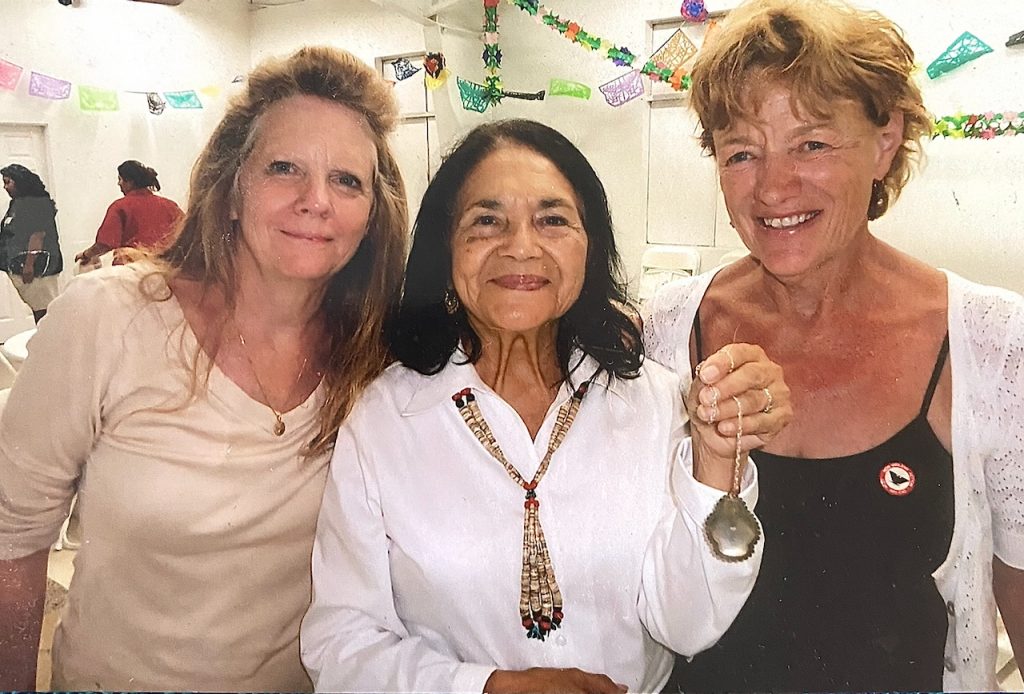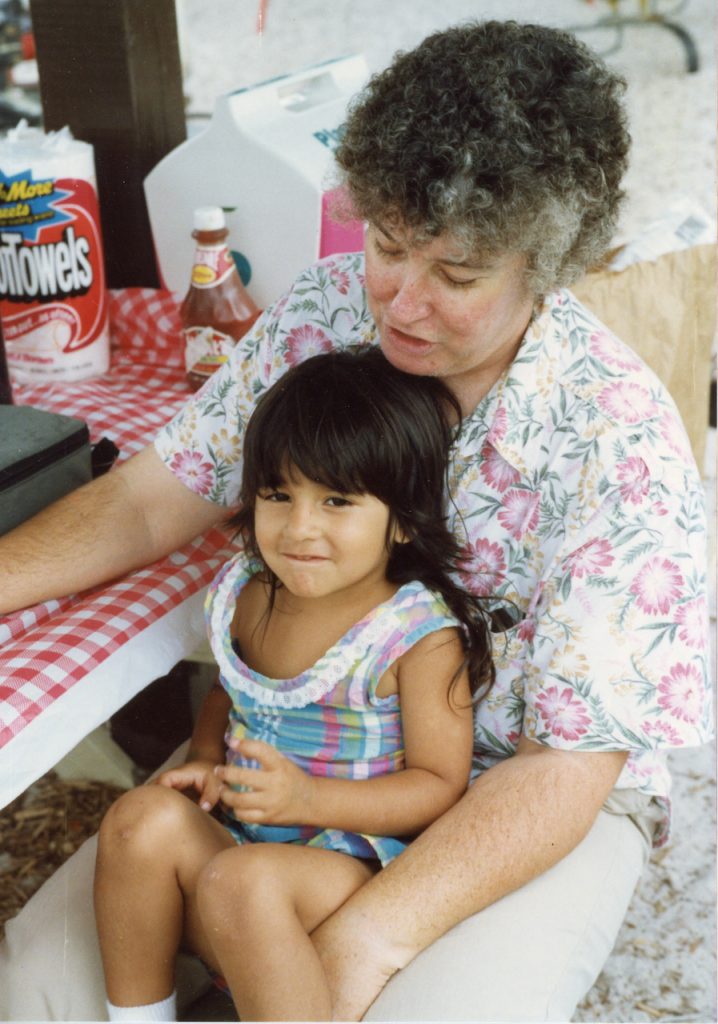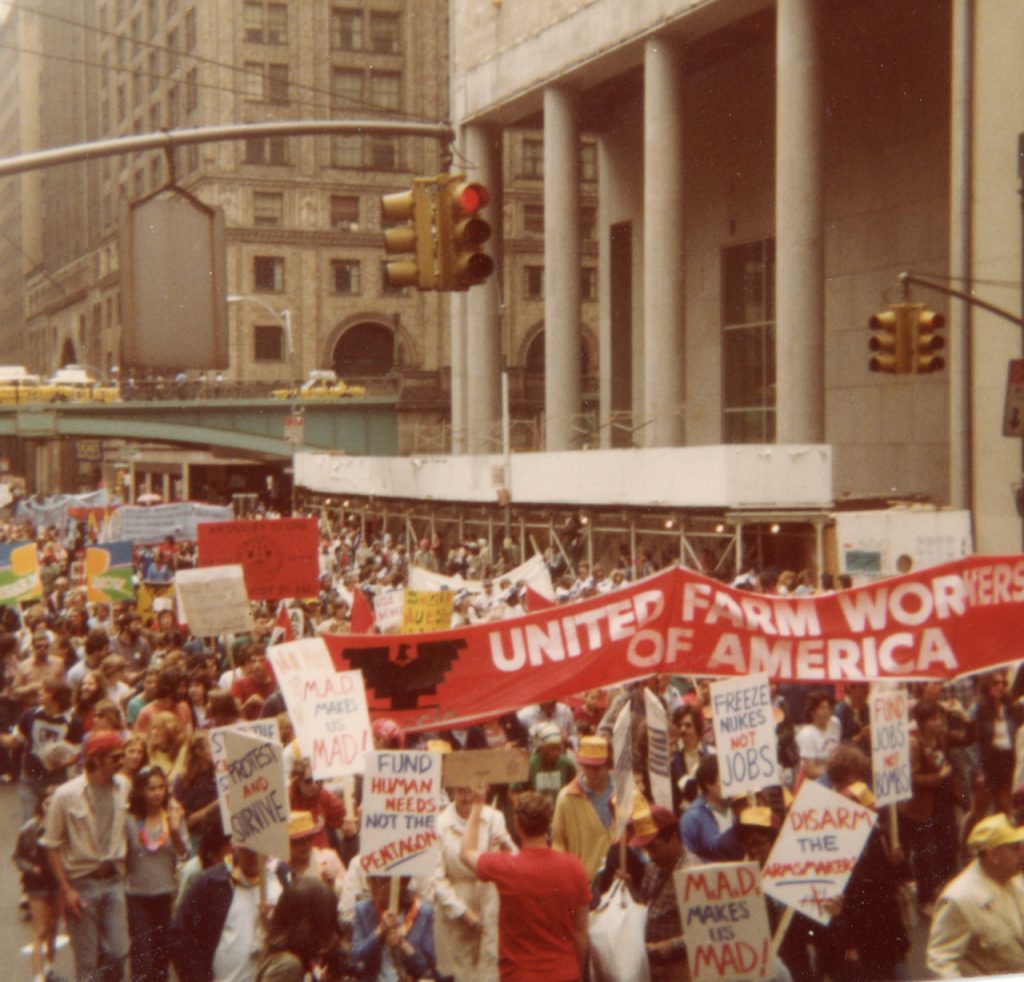Loretto and the Farm Worker Ministry: Standing Together for 50 Years!
Posted on September 27, 2021, by Loretto Community
What was on your dinner table this evening? Perhaps you enjoyed strawberries or lettuce, tomatoes, chilies, soybean products, cherries, corn, carrots, potatoes, avocados, beets and more, all representative of God’s abundant bounty. Credit the farmworkers for helping to put this delicious food on our tables. For 50 years and counting, Loretto has stood with the National Farm Workers Ministry “to advocate alongside farm workers in their struggle for just wages and decent working conditions.” Throughout these years, Loretto has been drawn into important, wonderful and learning relationships with farmworkers from many countries south of our border. We proclaim with them: YES, WE CAN! And Yes, they did!

Photo courtesy of Mary Jean Friel CoL
“¡Si, se puede!” (“Yes, we can!”) Standing with Farmworkers

Photo courtesy of Loretto Archives
Nearly 2 million farmworkers work in our orchards and fields, plant nurseries, dairies and feedlots. Eighty-five percent of our fruits and vegetables are hand harvested; without farmworkers our multi-billion dollar agricultural industry would not survive. Yet they labor long hours for low wages and suffer from heat stress and pesticide exposure in the fields. Isolated and excluded from some of the laws protecting other workers, farmworkers rely on concerned consumers to help achieve a measure of justice in the fields.
Throughout the years, Loretto members have met migrant farmworker families who lived in terrible situations, shared simple meals with them and held songfests. We learned their needs and responded; gathering their young children from the fields to begin day care programs, facilitating reception of the sacraments, enrolling their children in migrant schools, taking them for medical care, helping many with immigration papers and assisting with farmworker rights. We offered friendship, professional advice in various fields and care, and we received welcome and gratitude. We learned as much as we taught. Our relationship with the farmworker community continues to this day. Earlier this month, the “Immigration Spotlight” from Loretto’s Latin America/Caribbean Committee featured Julie Taylor, Executive Director of National Farm Worker Ministry discussing the 2021 “Farm Workers and Food Justice” campaign.
Some highlights from the early years
- Loretto’s ministry with migrant farmworkers took off in the late 1960s when novices and young professed sisters were sent out across Colorado and Wyoming each summer from the Loretto Centers in Denver and St. Louis to help migrants who worked in the fields.
- In 1970, former Loretto Sister Ruth Shy and Loretto Co-member Mary Jean Friel, at the time a Sister of Loretto, traveled to California to work with César Chávez, the United Farm Workers (UFW) and National Farm Worker Ministry. Ruth worked in the fields, and Mary Jean communicated with the press and helped with donations. Sister Pearl McGivney went to La Paz, Calif., at the invitation of the director of organizing for the UFW and joined that organization’s staff in 1972. She and Mary Jean were among those who worked for César Chávez; Mary Jean became Chávez’s executive assistant and was on the road a lot while Pearl remained at the UFW headquarters attending to administrative matters that Chávez had entrusted to her. Pearl headed the UFW’s efforts in Florida and in later years developed the field office of Centro Campesino in Auburndale, which remains in service today. She worked in Winter Haven, Fla., where she was part of the Farm Worker Ministry from 1981 to 1983 and with the Haitian Farm Worker Ministry in 1983. From 1984 to 1987, with the help of Mercy Sister Alicia Zapata, a Loretto co-member, Pearl served as an organizer with the Centro Campesino in Winter Haven. From 1987 through 2012 Pearl was co-director of the Farm Worker Ministry Inc. in Auburndale with Alicia. They helped the workers to organize for better wages and living conditions and assisted them and their families with immigration visas.
- At the height of the lettuce boycott in the early 1970s, many sisters worked to support the farm workers in the San Fernando Valley in California (Ruth Shy acted as coordinator at the field office.), and in Los Angeles, Florida, Philadelphia and New York City.
- Across the United States, Loretto Community members provided housing and support to those who were traveling in support of boycotts and strikes.

Photo courtesy of Loretto Archives
Loretto says thank you to the farm worker community. You have revealed to us the face of God.
